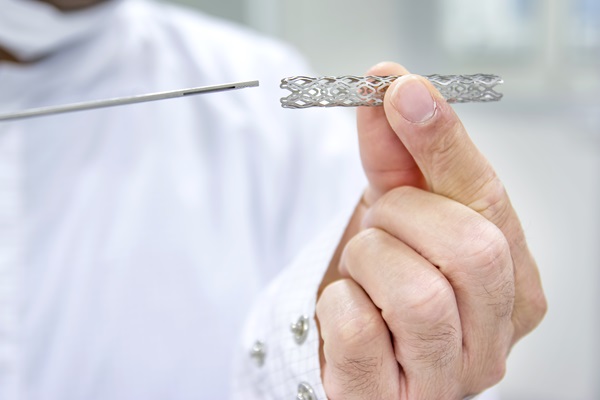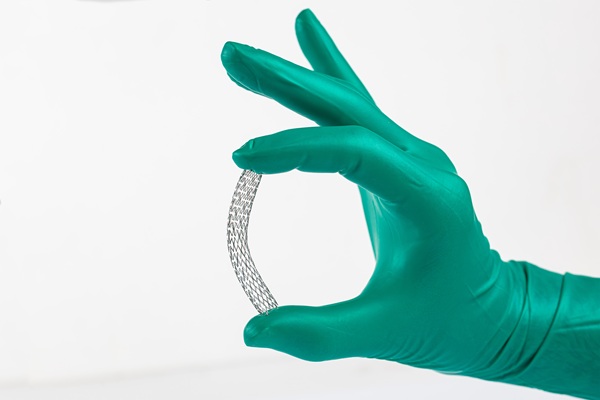How Coronary Stents Improve Blood Flow and Heart Health

Coronary stents improve the blood flow to the heart. When blood flow is restricted, it is usually a result of heart disease or blocked or narrowed arteries. These conditions can lead to serious, life-altering side effects. Fortunately, coronary stents can significantly decrease the risk of said side effects with a minimally invasive procedure.
What are coronary stents?
Coronary stents are tiny tubes or coils comprising metal or mesh materials. According to the National Institutes of Health, or NIH, cardiologists use stents to hold open the passages or coronary arteries in the body, which are responsible for delivering oxygen-rich blood vessels to the heart. Often, these passages become narrow or blocked due to plaque buildup, effectively restricting blood flow.
Types of coronary stents
According to the NIH, there are four types of coronary stents:
- Bare metal stents (BMS). Considered the original coronary stent, metal tubes that allow tissue to grow around it
- Bioresorbable scaffold system (BRS). Coronary stents that gradually dissolve and are seen as temporary support
- Drug-eluting balloons (DEB). A coronary stent's balloon that is coated with an anti-proliferative drug that is released into blood vessel walls
- Drug-eluting stents (DES). Coronary stents coated with medication that is slowly released into the target artery to prevent the growth of scar tissue
After an in-depth evaluation, the cardiologist will determine the most effective coronary stent.
Preparing for the coronary stent procedure
Sometimes, patients do not have time to prepare for their coronary stent placement procedure. However, if a nonemergency appointment is scheduled, patients should prepare by:
- Noting all prescription and over-the-counter medication and herbal supplements. Include their frequency of use, dosage, and duration of use
- Adjust or stop taking certain medications. Blood thinners or nonsteroidal anti-inflammatory drugs (NSAIDs) are typically prohibited, but the cardiologist will review each of the patient's medication list and receive clearance from their primary care physician
- Fasting. The cardiologist will advise on the appropriate time to avoid food and liquids, usually up to eight hours beforehand.
- Take approved medications. The cardiologist may prescribe a medication for the morning of to be consumed with just enough water to swallow them
- Arrange a safe ride home. If able, ask a family member or friend for a ride home
What to expect during the coronary stent procedure
Note that cardiologists typically place coronary stents while performing a procedure called angioplasty, opening the artery by inflating a balloon. The cardiologist will place small sticky square patches on the patient's chest before shaving the area where the tube or coil will be inserted. They will then place an IV in the patient's hand or arm so that medication can help relax them during the process and help them stay awake. Note the area that will receive the catheter will also be numb.
Once all medications have taken effect, the cardiologist will create a small cut in the chest, deep enough to reach the blood vessels. Next, they will insert a catheter, a tube with a balloon at the end, into the cut. The catheter will allow the dye to flow so the cardiologist can see where the stent will be placed inside the body on a screen. Once they inflate the balloon, the artery walls will be wide enough to accept the stent, and the catheter is removed. The cardiologist will easily insert the coronary stent, pushing it through before suturing the cut. The cardiologist will repeat the process if there are multiple narrowed or blocked arteries.
Call us for more information
Coronary stents can be a saving grace for those with narrowed or blocked arteries. To learn more about this procedure or how to improve your heart health, do not hesitate to give Florida Premier Cardiology a call. We proudly serve residents in and around the Boynton Beach area.
Request an appointment here: https://boyntonbeach.floridapremiercardio.com or call Florida Premier Cardiology at (561) 229-1411 for an appointment in our Boynton Beach office.
Check out what others are saying about our services on Yelp: Read our Yelp reviews.
Recent Posts
Coronary stent placement is a treatment for coronary artery disease, a buildup of plaque (fat and cholesterol) around the heart's arteries. Along with angioplasty, a stent helps restore blood flow to the heart, relieving symptoms such as chest pain and shortness of breath and helping prevent a heart attack. The following overview of coronary stent…
Heart disease treatment encompasses a range of interventions, from lifestyle changes and medications to surgical interventions. Individuals can manage their condition and improve their quality of life by working with a cardiologist. Successful heart disease treatment starts with the patient having the information they need to make informed decisions about their health.Also known as cardiovascular…
A heart specialist is a doctor specializing in diagnosing and treating cardiovascular conditions. Patients may be referred to one of these doctors for several reasons, from diagnosing a heart health issue to getting cleared for surgery. However, seeing a heart specialist is even more crucial for those either experiencing the signs of heart disease or…
Cardiologists perform angioplasty to open blocked arteries, specifically those caused by coronary disease. This minimally invasive alternative to open heart surgery can restore proper blood flow to the heart and often reverse the fast track to a heart attack. However, learning when one is necessary is crucial for treatment success.Coronary artery disease (CAD) is a…


